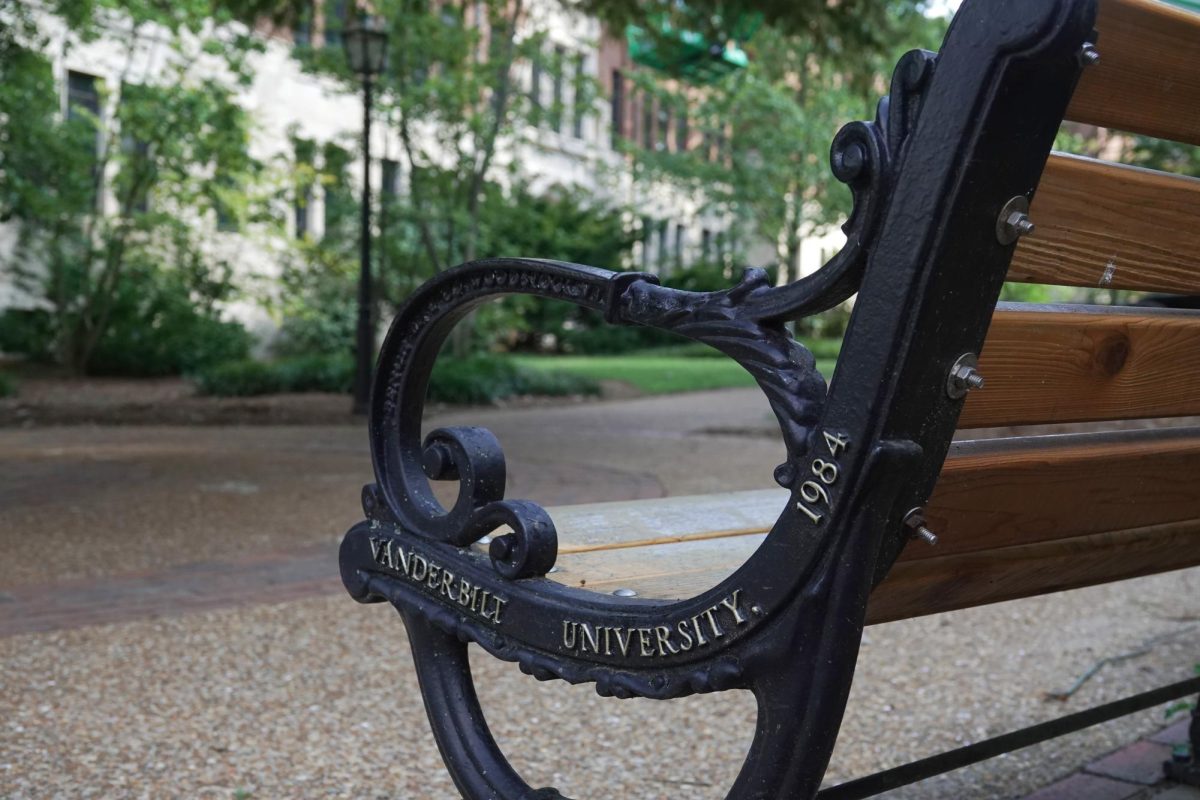Growing up, I never felt unwelcome, inept or alienated from my peers in mathematics class. A love for numbers was something my parents and I shared. They saw my blossoming potential and hungry mind and were eager to water it, teaching me my multiplication tables early and helping me figure out strategies for solving puzzles in an online math game assigned by my school. Math has always been my favorite subject, and I looked forward to that class period each day at school for twelve years of my life. In the math classroom, I knew I was competent. Of course, I still had so much to learn, but I was confident in my own abilities and the support system that I had.
But I’m disappointed to admit I can’t say the same about my Vanderbilt math classes.
The first math class I took at Vanderbilt was MATH 1300, which is Calculus I. This course is notoriously difficult, often branded as a “weed-out” by students who have taken it. It did not fail to live up to its reputation. While I struggled in MATH 1300, my saving grace was undoubtedly the community I found there. My professor heavily emphasized the value of collaboration and encouraged us to work together on practice problems, so my classmates and I made a group chat in the first week of classes and met regularly throughout the semester to support each other through homework and exam prep. When I was taking Calculus II and III, I experienced a similar sense of community that was more than an array of other brains I could collaborate with to solve problems. Whether I realized it or not at the time, it was a support system, a group of peers that helped me see that I was not alone in my arduous quest to master mathematics.
Shortly after this semester began, I got a bitter taste of what my future math classes would look like. I walked into a new classroom for a new semester, eager to see what my new math class — this time, Differential Equations — would hold, only to find that I was one of only three or four women enrolled in my class of 20 people. Math has always been my academic niche, but I suddenly felt out of place. Although this unbalanced ratio came as a shock to me this semester, in retrospect, it really shouldn’t have. Introductory calculus courses are an entry-level prerequisite for many areas of study at Vanderbilt, including economics, engineering and the pre-medical track. Because so many students are required to take a calculus course, I encountered students from a variety of majors, even though I am a mathematics major. With such a mixed bag of disciplines, I never really noticed a disparity in the gender ratio in my classes. I realized that as the difficulty of my math courses increased, the number of women who took them had significantly dwindled.
Women in male-dominated fields undoubtedly are likely to feel more pressure to succeed because there are fewer of us and it can feel like we represent our gender in these fields. This gender disparity present in fields like mathematics is a known and widespread phenomenon, which raises several questions. Why does it exist in the first place, and what are its effects on women in these fields?
In an article called “The Brilliance Trap,” Andrei Cimpian of New York University and Sarah-Jane Leslie of Princeton University discuss the results of a pioneering study exploring the relationship between stereotypes about genius and the proportion of women and minorities in academic fields. Cimpian and Leslie surveyed nearly 2,000 academics by email across 30 fields to determine if and to what degree these academics believed that “some form of exceptional intellectual talent was necessary for success in their field.” They used a measure called the field-specific ability belief index to gauge how much people think natural talent, rather than effort, is needed to succeed in an academic field. Then they cross-referenced this with the gender demographics of each field. The results were striking.
“Fields that placed more value on brilliance also conferred fewer Ph.D.s on women,” Cimpian and Leslie wrote. “The greater the emphasis on this single fixed trait, the fewer doctoral degrees were awarded to… [this] group.”
These results underscore the idea that a field’s emphasis on brilliance deters women from pursuing a degree in those fields because brilliance is most commonly associated with men. The ultimate message this sends to prospective academic students is that women do not belong in these fields and will not succeed in them. This phenomenon isn’t specific to math, either; as per the figure from Cimpian and Leslie’s study, it extends to many other STEM disciplines.
Most people would agree that the notion that women aren’t as smart as men and that they can’t succeed in academia — particularly in computation-heavy STEM disciplines — is wildly outdated. Most people would agree that overtly sexist comments are completely unacceptable. Yet whether they realize it or not, people in these fields continue to reinforce the message to women that they don’t belong.
When I walked into my differential equations class on the first day of this semester, I was elated to see a woman standing at the front of the classroom, writing bullet points from the syllabus on the chalkboard. This is my fifth math class at Vanderbilt: three were taught by men, and this is my second to be taught by a woman. My professor was wonderful, reasonable, brilliant, caring and competent — everything you’d want to see in someone who holds your education in their hands. From what I’ve heard and observed, most of my classmates seem to feel the same way. So, why do the men in my class sometimes talk amongst themselves the entire time my professor is teaching — just as they did in my only other math class here taught by a woman? Why do they correct her minor algebra mistakes on the board — mistakes that every professor would agree they occasionally make — in an overconfident, self-assured tone that screams “I’m smarter than you?” This never happened in my math classes taught by men.
In that kind of atmosphere, it’s extremely hard not to feel some added pressure to prove that you are enough and that you are just as qualified to be there as everyone else.
When my first differential equations exam came around, I wasn’t incredibly worried; I had been keeping up with the material and paying attention in class, and I’ve kept a 4.0 GPA for my math major since starting college. But as I continued to study, I found myself growing more worried instead of more confident. At first, I wasn’t quite sure why, considering I had faith in my understanding of the material and just received an excellent test grade on a math exam in another class. I soon realized that my worries were due to the anxiety of proving my merit. As one of the few women in that class, I felt a considerable weight on my shoulders. This feeling was compounded by my role as a new Calculus II course assistant, which required me to take a science education pedagogy seminar. In the seminar, we had recently learned about microaggressions in the classroom and how to manage them. They were weighing heavily on my mind as I struggled to balance helping younger students with finding my own sense of belonging in my math class.
My exam was set to be on Friday of that week. On Tuesday, I was trying to work through a proof but was still confused after 40 minutes of reading and re-reading it. My professor clarified it for me during office hours the next morning, but I left her office more irritated than I had been when I came in — and not because of an inability to understand the content. During office hours, I noticed that the three or four other students in the room were all men. Even though I knew I was just as capable as them, I found myself filtering my questions in fear of sounding foolish to them.
I hated that. I hated that I let it get to me. I hated that simply thinking about the disproportionate gender ratio could make me feel that way, even in the absence of explicitly sexist comments. Most of all, I hated how insecure I felt and how insecure I felt about being insecure.
I was beyond frustrated with my male classmates, with society, with the field and with myself. Being part of a marginalized group in my field provided an additional obstacle to focusing on learning in that class. I love math, and all I wanted to do was concentrate on doing my best on my exam. Yet, I couldn’t help but feel that I had something extra to prove to myself and my classmates as one of the handful of women representing our gender in the class. My grade was no longer a representation of how much I understood the content but became proof that I could score just as high as my male classmates could, even if they never knew my score and I never knew theirs.
These microaggressions and the gender disparity in mathematics and other STEM fields weigh heavily on my mind and my heart. A large part of my success in my calculus courses is due to the friends I found in those classes, but finding a support system of people who understand your unique struggles in a course can seem nearly impossible at times. I’ll be the first to admit that the microaggressions I experienced in my math class this semester have made it difficult to want to walk into class and office hours each week despite my ever-developing appreciation for the beauty of math. Math is my first class for three days of the week, and my negative encounters there always have a profound effect on my state of mind for the rest of the day. Between the sexist comments made directly toward me and the men shoving iPads in my face during office hours to show me their own answers over my professor’s, to say that these aren’t good ways to start my morning would be an understatement. But to anyone else in marginalized groups struggling to find community and refuge in their respective fields: I hear you, and you are not alone. I remind myself day after day that there is no shame in feeling the added pressure of being one of the few representatives of your group in your field. Innate brilliance is nothing without determination, perseverance and hard work. You are not any less smart or capable, and most of all, you belong in your field just as much as anyone else.














